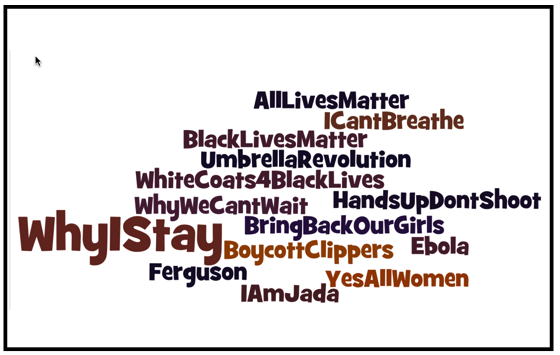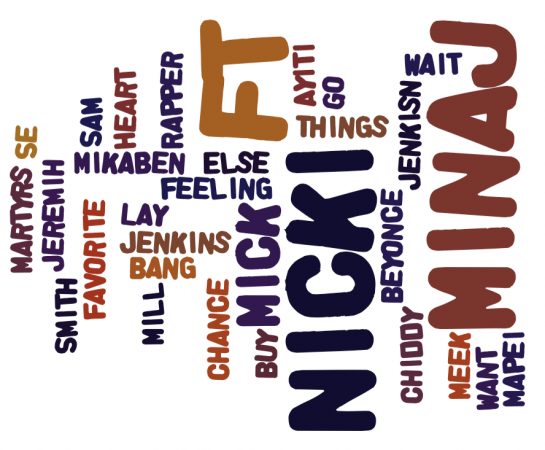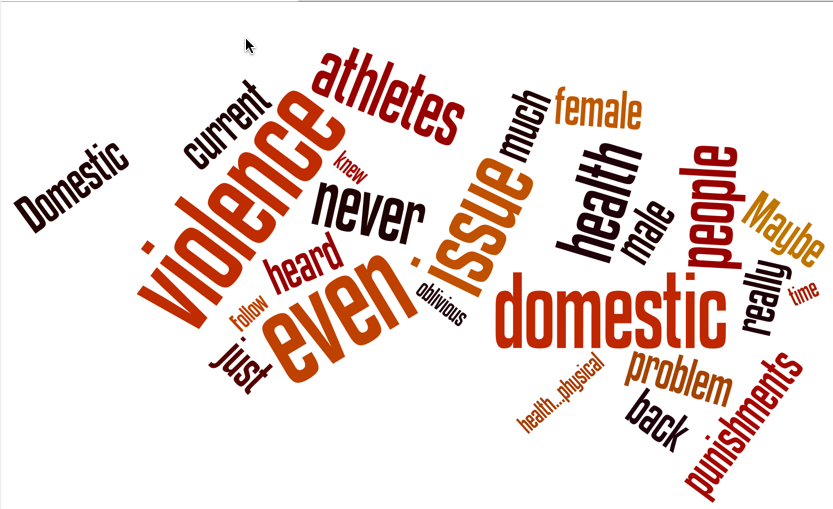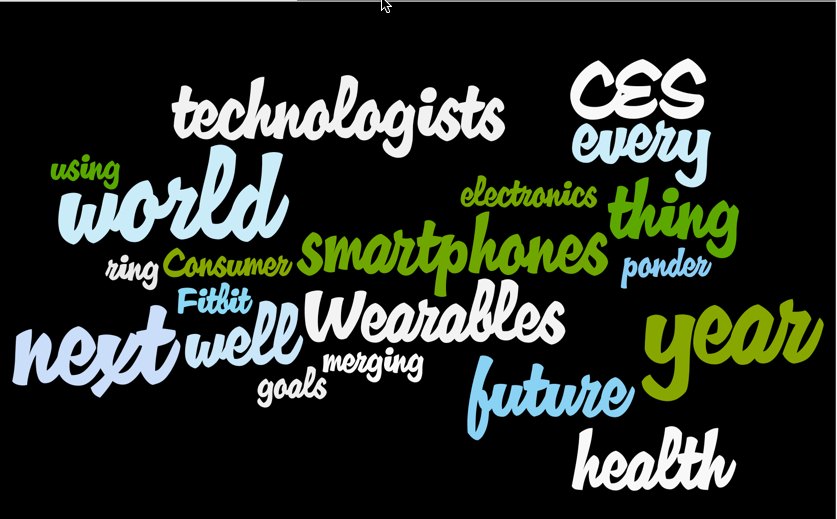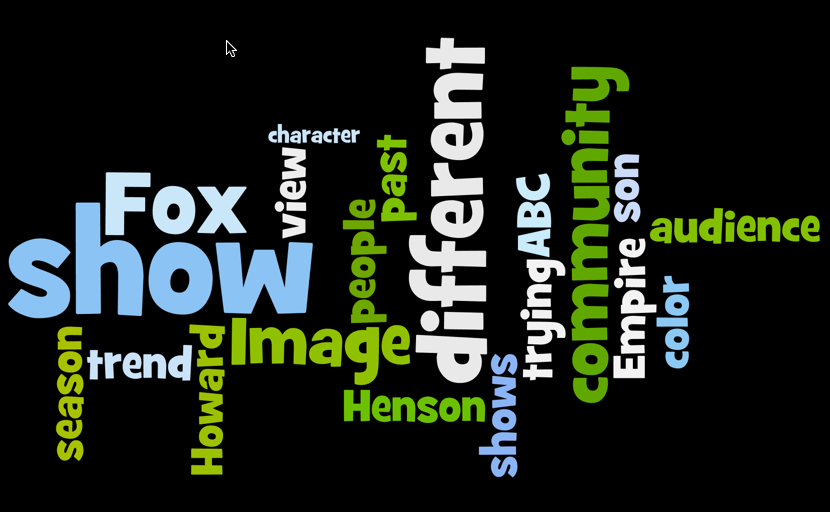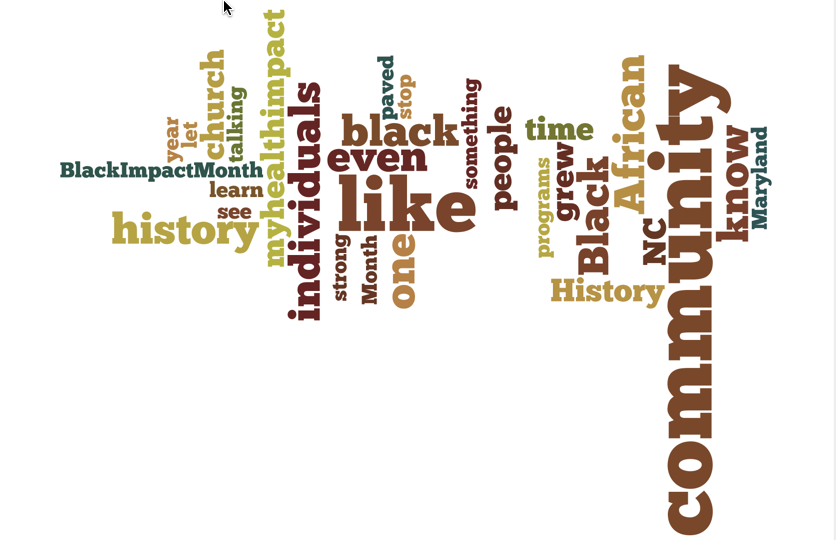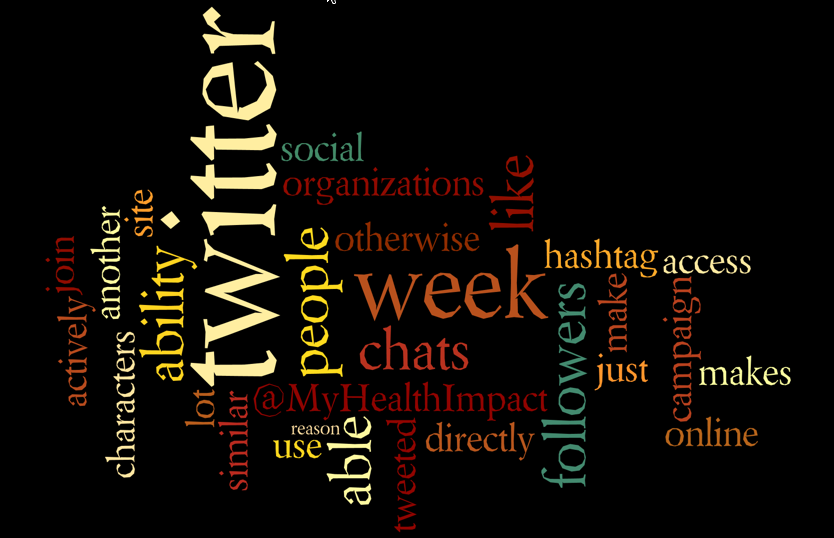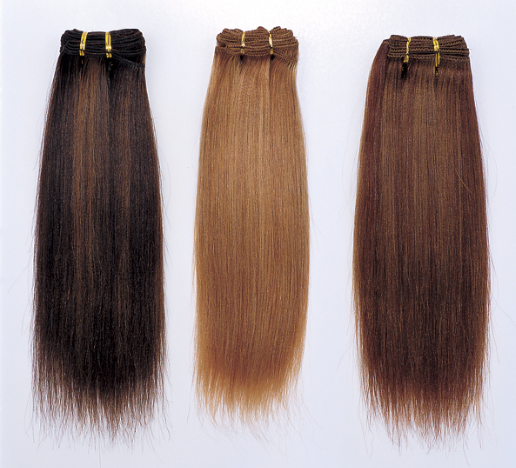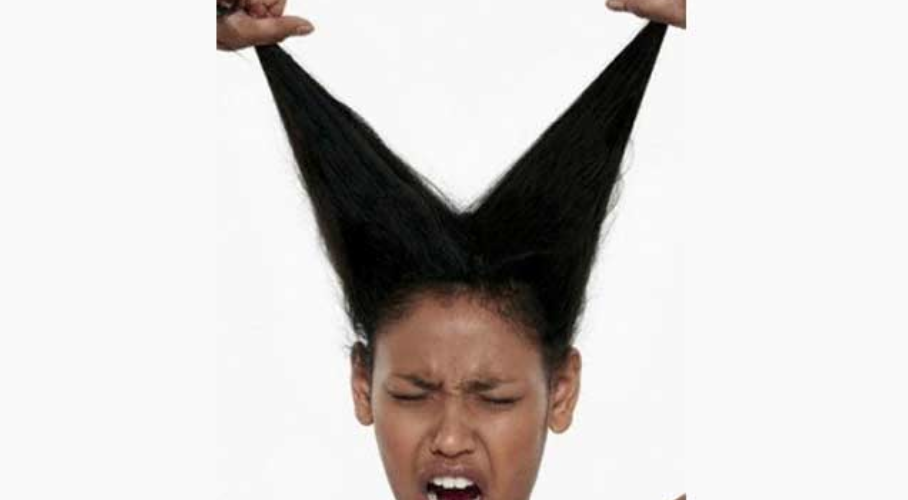myHIN Blog
Category: Black Hair Articles
March 01, 2015
MyHealthImpact Topics 2015
Click on the word clouds below to see a recap of the wonderful blogs by our Research Team so far in 2015.
Stay tuned to @myhealthimpact for more news on the interconnection between health and tech!
Share

December 11, 2014
Kitchen Beautician
I spent this weekend being a beauty stylist. I colored and straightened my sister’s hair, colored my friend’s dreadlocks, wash and straightened my hair, and tried another hair project that was completely new for me. My sister and I tried our hand at wig making! We watched a couple YouTube videos and decided, “Hey, Let’s do it!”
To give you an idea of my hair, I am a naturalista with shoulder length hair. I have the opportunity to try a lot of styles with my hair and that’s what I love about it. One day my hair can be bone straight and the next day I can have a bushy twist out. I LOVE THIS FLEXIBILITY! However, playing with all the flexibility of my hair does have a down side. The constant manipulation of my hair can lead to hair damage. This is why wigs and wearing tracks(hair extensions) is so amazing. In addition, I really want to see my hair in a short pixie style but I’m honestly not ready to cut my real hair yet.
Wigs often get the connotation of being only for those who are suffering from hair loss related diseases or the inability to grow hair, but wigs offer so much more than that. They are a fun way of expressing yourself and I challenge you all not to knock it until you have tried it. With extensions, you can keep your real hair in a low maintenance style such as cornrows and on top sew in some weave or wear a ‘hair hat’ to try a different look. One of the most beautiful things about being a black woman is the choice to have versatility with your hair. So why not explore that versatility? If things don’t come out the way you want it’s not the end of the world. It’s just hair, and certainly, I do not let hair dictate my workouts.
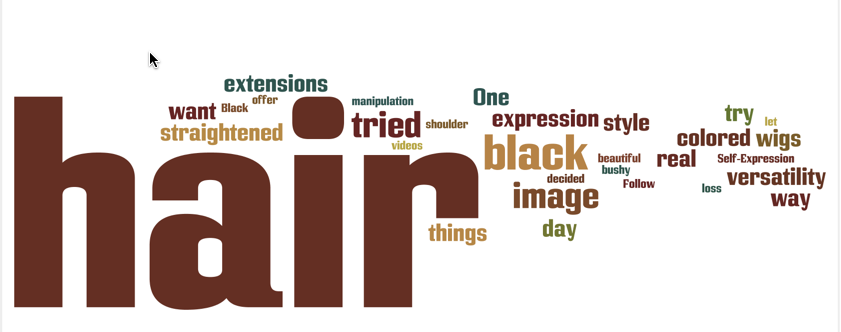
#Images #Self-Expression #Health #Hair
Follow @myhealthimpact for more on self-expression.
Share

June 04, 2014
For Brown Girls
I’ve recently begun blogging and the story of Karyn Washington the creator of ‘For Brown Girls’ caught my eye and captured my heart. Washington reportedly committed suicide at the tender age of 22 after suffering from depression stemming from the loss of her mother. This hit my heart for two reasons. 1. She’s only a year older than me…a college student and 2. She’s a blogger that was interested in empowering and encouraging women to love themselves. These two things are practically I. I’m amazed at the fact that as she still desired to help others and while doing so, she was dealing with her own things.
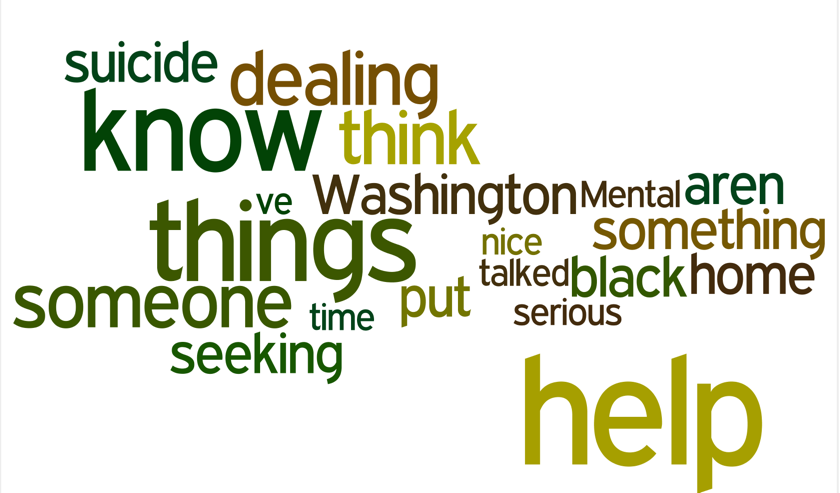
Mental health is something serious. Did you know that depression is a mental illness? Let me make something really clear: you, we, she, he is not exempt. College students are not exempt. We (the black community) always seem to think that some things “aren’t what black people do”. Mental issues, mental health and stability have no face, color, socioeconomic status or background. Depression and suicide are things we deal with right in our own backyards…our own living rooms. We have to know and understand that there is nothing wrong with seeking help. You aren’t crazy for seeking help with coping with the loss of a parent or dealing with suicidal thoughts or even for being sad. Those sad thoughts may be more serious than you think if not tackled. To me and I don’t know how much my opinion counts to you but I truly admire those that are out to better themselves and are worried about their own well-being; self-love. I’ve noticed that the black community…it’s of our culture to believe that what happens in our home, stays in our home and that our issues will not be talked about and ridiculed among complete strangers or the Joneses’. Seeking help is saying I know I’m dealing with some things and recognizing the fact that all things aren’t able to be solved in the comfort of your own home but better on someone’s couch. We, yes WE must kill the stigma placed around seeking help. Did we think that these resources were put into place to hinder? We must kill our prides.
I’m sure committing suicide was the last thing on Karyn Washington’s mind at some point; let’s be real here her purpose was to help, promote self-love and seeing the beauty in which we are. I think it’s fair to say everyone can put on a façade but a façade can only be put on for so long. You never know what people are dealing with. Take the time to say something nice. Take the time to check on someone that you haven’t talked to in awhile. You never know what someone is going through and how much of a positive effect your nice words and thoughtful actions can be of help. Know that it is ok to seek help. Do not allow someone to talk you out of taking care of you.
See @myhealthimpact on Twitter, the web at myhealthimpactnetwork.org and on Tumblr for more information on mental health.
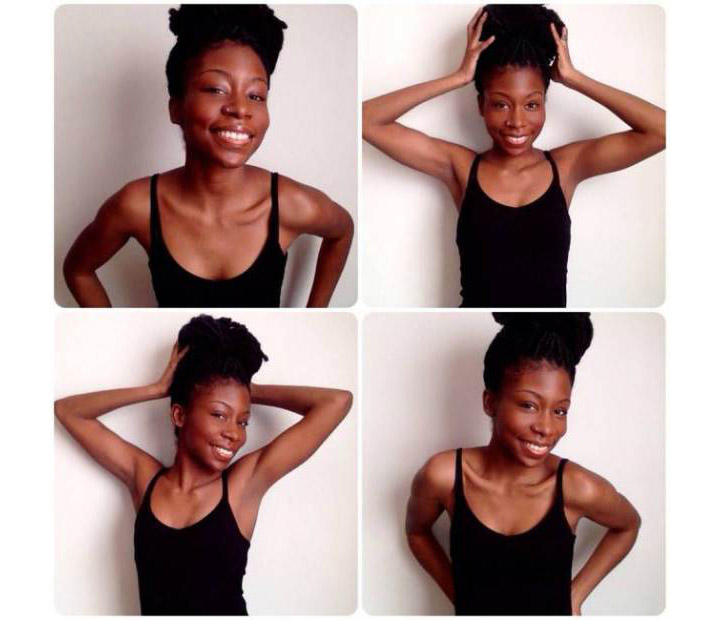
Gone too soon….
Share

March 02, 2014
Keiara’s Journey to Fit
This time around, I’m really staying focused and I’m truly committed to being healthy and losing a few extra pounds. I started out with a Dr. Oz detox plan that lasted two weeks. After the first two weeks, I decided to keep myself on a modified diet. My diet consists of no fast food, lots of fruits and vegetables, no fried foods, monitoring my sugar and carbohydrate intake and if possible eating meat once a day. In observance of #meatlessMonday’s I definitely try my hardest to do so and go meatless. I’ve been using an app called MyFitnessPal to keep track of what I eat and caloric intake. Along with this, I have become extremely conscious of labels and serving sizes. If it has a label, I have read it! Along with eating right, exercising is an essential part of getting healthy and losing weight. Due to my hype of being completely committed, I decided to order Insanity and Black Girls Workout Too as an alternative to just going to the gym. These DVDs also come in handy when I just don’t feel like making moves to the gym or even leaving my apartment, I have zero excuses. To keep myself on schedule or to at least have a plan and to keep track of what I’ve done (or what I haven’t done), I have a workout calendar that denotes what I should do. With every completed workout, I place a check mark on that particular day. By far, my only issue is stepping on the scale every day. I’m addicted. Lol. I’m proud of myself for staying on track and I encourage others to do the same. If you’ve fallen off track, don’t wait until tomorrow, do it today! A huge misconception is that eating one bad thing will knock you off course, it won’t just don’t make it a continuous habit of eating bad things, overeating or skipping workouts (whatever you may struggle with). I definitely wish everyone the best of luck…you aren’t in this alone!!

Share

August 28, 2013
Unconscious Bias and Your Health
Almost one year ago, I presented to a group of black female college students on the topic, “You Ain’t Crazy: It’s Your Mental Health”. The sisters wanted to have a frank discussion around dealing with the stress associated with day-to-day issues, such as matriculation at a predominately white institute, culture, family, sexism, racism and how life plays out. Responding to the pressures of it all, one student was asked why did she seek help with her issues, and her response was simple: “to make sure that I don’t go crazy”. One point of frustration highlighted by these students was the interplay between perception and reality. There was the constant practice of second guessing their decisions, particularly scenarios dealing with race and culture. After all, who wants to read more into a situation than is there? You know the questions: “Did he mean to say that? What does he mean? How should I take what was said? How would you perceive that?”
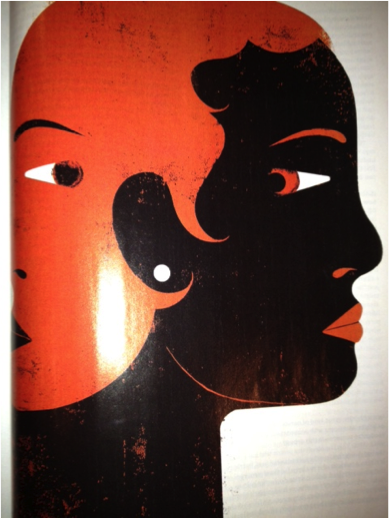 Reading the situation is a complicated topic, or is it? Dr. David R. Williams, professor of sociology and public health, discusses the topic of unconscious bias in the lives of Black Americans in the September 2013 issue of @essencemag. The two-face depiction captures the article’s title, “No, You’re Not Imagining It”. Williams offers a myriad of scenarios that often causes pause. That is, as a Black person, “Is this really happening to me?”. The element of surprise can grip Black folks though the bias imparted by whites can be unintentional. Yet, the outcome or reality of the scenario can have a profound effect on the recipient. Scholars define unconscious bias as the understanding that people can consciously believe in equality while simultaneously acting on subconscious prejudices they are not aware of.
Reading the situation is a complicated topic, or is it? Dr. David R. Williams, professor of sociology and public health, discusses the topic of unconscious bias in the lives of Black Americans in the September 2013 issue of @essencemag. The two-face depiction captures the article’s title, “No, You’re Not Imagining It”. Williams offers a myriad of scenarios that often causes pause. That is, as a Black person, “Is this really happening to me?”. The element of surprise can grip Black folks though the bias imparted by whites can be unintentional. Yet, the outcome or reality of the scenario can have a profound effect on the recipient. Scholars define unconscious bias as the understanding that people can consciously believe in equality while simultaneously acting on subconscious prejudices they are not aware of.
Williams and other public health scholars have determined that the outcome is not a mere sense of challenge of the parts of Black people. As noted in the Essence piece, someone who 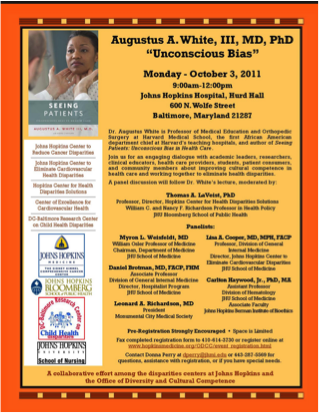 fosters and imparts racial prejudices can do so implicitly; though often automatic, the unconscious bias behavior leads to differential treatment – without effort. Unconscious bias influences the lives of Black people in the form of employment (hence, economic), educational and yes, health and health disparities – albeit heart disease, hypertension, diabetes, obesity, engagement in sexual risk behaviors and depression. While the scenarios offered by Dr. David R. Williams represent every day life as we move about, the resulting questions are commonplace but thought-provoking: “Do you see me? “, and if you do, “how do your see me? In health care, public health scholars ponder the same questions. The relevance here is how you see me starts the dialogue of how your treat me as a person and as a patient.
fosters and imparts racial prejudices can do so implicitly; though often automatic, the unconscious bias behavior leads to differential treatment – without effort. Unconscious bias influences the lives of Black people in the form of employment (hence, economic), educational and yes, health and health disparities – albeit heart disease, hypertension, diabetes, obesity, engagement in sexual risk behaviors and depression. While the scenarios offered by Dr. David R. Williams represent every day life as we move about, the resulting questions are commonplace but thought-provoking: “Do you see me? “, and if you do, “how do your see me? In health care, public health scholars ponder the same questions. The relevance here is how you see me starts the dialogue of how your treat me as a person and as a patient.
As I reflect on recent life circumstances, I ponder my own moments of unconscious bias experiences. There I am in the supermarket as I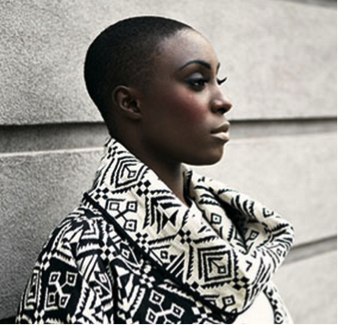 shop for the next family dinner. The checkout clerk pauses, looks and proceeds to ask me: “Why is your hair so short? Are you a cancer patient, or are you making a statement?” Now, the picture shown here is not I, but the style is one that I own. I am not making a statement nor am I a cancer patient. The politics, bias and perceptions of Black hair, particularly for Black women, is a subject reserved for a read of Dr. Lynette Kvasny’s blog, Black Women’s Love Affair with Hair”. Yet, the very question and judgment (“or making a statement, cancer patient) speaks volumes. My response to the clerk was “what if I am a cancer patient?” His apologetic comments followed as I completed my transaction.
shop for the next family dinner. The checkout clerk pauses, looks and proceeds to ask me: “Why is your hair so short? Are you a cancer patient, or are you making a statement?” Now, the picture shown here is not I, but the style is one that I own. I am not making a statement nor am I a cancer patient. The politics, bias and perceptions of Black hair, particularly for Black women, is a subject reserved for a read of Dr. Lynette Kvasny’s blog, Black Women’s Love Affair with Hair”. Yet, the very question and judgment (“or making a statement, cancer patient) speaks volumes. My response to the clerk was “what if I am a cancer patient?” His apologetic comments followed as I completed my transaction.
Case 2: I had a medical procedure done which was a high stress experience . The waiting for the test results was heave, scary and a prayerful time. During the film read with a physician, I stated aloud” “the mass has a meniscus”. To which the physician replied, “how do you know that? How do you know meniscus? How do you know this? This surprises me”. His surprise momentarily precluded the focus on my medical care. My simple reply to his disbelief was “Chemistry 101 Lab and can we focus on my health”.
Then, there is the unconscious bias imparted in the workplace, the unconscious 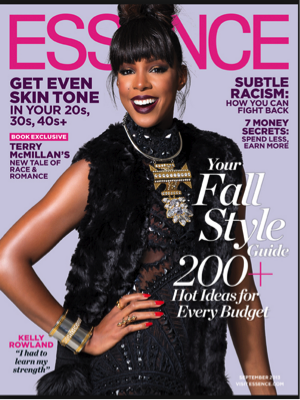 organizational impact. This level of bias creates an organizational culture that permeates bias rather intentional or unintentional. This mini-me culture can reinforce bias. This can create personal stress particular in hostile workplace environments. The “I understand; I am sorry”, conjectures do little to offer individual support or reduce health stressors. As one sister indicated in that August 2013 session, “Don’t let them steal your joy”.
organizational impact. This level of bias creates an organizational culture that permeates bias rather intentional or unintentional. This mini-me culture can reinforce bias. This can create personal stress particular in hostile workplace environments. The “I understand; I am sorry”, conjectures do little to offer individual support or reduce health stressors. As one sister indicated in that August 2013 session, “Don’t let them steal your joy”.
As Dr. David Williams offers in the @essencemag article, there are others ways to confront these scenarios. Taking care of your health tops his recommendations. Be resilient, and visualize positive outcomes. Breathe. Pause. For as much I share this advice, am I talking to myself? Yes, constantly. After all, it is my (@myhealthimpact) physical and mental health to protect.
Share

August 18, 2013
Black Women’s Love Affair with Hair
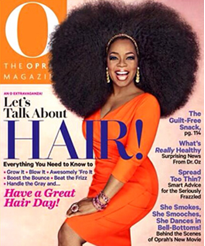
Black women’s hair is a miraculous thing! Naturalistas sporting fabulous afros, twists, plats, braids, and locs. Bold sistahs rocking close-cut fades and TWAs. Sophisticated ladies wearing sleek perms, extensions, and weaves. Long or short, kinky or straight, black hair don’t care. To keep our diverse hairstyles tight, Black women spent nearly half a trillion dollars on hair care in 2011! Oprah Winfrey rocks a fierce, 3lb afro wig on the cover of her August 2013 magazine’s issue on hair.
This is part of a long tradition of Black women’s love affair with their hair. In the early 1900’s, Sara Breedlove, popularly known as Madam C.J. Walker, became the first female self-made millionaire in America. She amassed her fortune inventing wildly popular African American hair care and cosmetic products. Her company also trained sales beauticians known as “Walker Agents” who went out into Black communities and promoted Walker’s philosophy of “cleanliness and loveliness”.
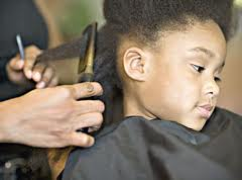
Today, changing hair is simply a fashion statement for some Black women. Just like changing clothes, we can wear a curly fro on Monday and slick our hair back into a bun on Tuesday. This styling versatility is a hallmark of black women’s beauty, and learning how to care for our hair is an important cultural practice. Many of us have fond (and not so fond) memories of having our hair wash, detangled, braided, pressed, and otherwise cared for by our mothers, aunties, grandmas and girl friends. Hair straightening was a rite of passage for most Black women. While younger women know all about the flat iron, those of us from the old school will recall getting our hair straightened (and ears singed) with lots of grease and a sizzling hot comb in the kitchen. Yet, we all remember those trips to the beauty salon where we listened in amazement as to the grown folks talked while we got our hair done.
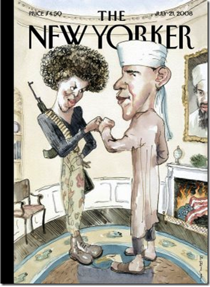 Black women may also style their hair for purely functional purposes. Perhaps we splurge and get long silky extensions for a formal affair like our sister’s wedding. Or in the summer time, we may wear hassle-free microbraids for a vacation at the beach. When we are short on time or have to meet the demands of work or school, perhaps we go in for “the big chop” or loc our hair to achieve an easier to maintain style that reduces or even eliminates trips in the beauty salon. With the growing natural hair movement, some black women are asking if we are seeing the end of the Black beauty salon culture.
Black women may also style their hair for purely functional purposes. Perhaps we splurge and get long silky extensions for a formal affair like our sister’s wedding. Or in the summer time, we may wear hassle-free microbraids for a vacation at the beach. When we are short on time or have to meet the demands of work or school, perhaps we go in for “the big chop” or loc our hair to achieve an easier to maintain style that reduces or even eliminates trips in the beauty salon. With the growing natural hair movement, some black women are asking if we are seeing the end of the Black beauty salon culture.
Sometime we style our hair in its natural state as self-affirming statement of racial and cultural pride, for ease of maintenance, or as a healthy choice. However, even as more women choose to where their hair naturally, it is still largely seen as socially unacceptable.
Even the FLOTUS can’t escape public scrutiny of her hair choices. One of my favorite online comment: "Girl, ain't no braids, twists, afros, etc. getting into the White House just yet ... LOL." Ya’ll remember the New Yorker cover that depicted Michelle with an afro and a rifle? When a naturallycurly.com web poll asked if the U.S. was ready for a first lady with natural kinky hair, 56% of respondents said “no”. Indeed, Michelle Obama’s hair carries a lot of cultural baggage.
So here we are in 2013 and Black women’s hair remains politicized! Sistahs on the job market still wonder aloud if the texture or style of their natural hair will prevent them from being hired. Only women with long silky hair need apply? Sistahs are also being told by Glamour magazine that “political” hairstyles like locs and afros are considered inappropriate in some places of work. Rhonda Lee, a Black female meteorologist, was fired from her job on a Louisiana TV station after publicly defending her ethnic hair. Black women, including Solange Knowles, have had TSA security guards demand to search their natural hair before boarding the plane. (I’ve also had my own “flying while naturally Black” experience when I had my locs in an up-do while boarding an airplane). Incidents such as these inspired MSNBC correspondent Melissa Harris-Perry devoted a 3-minute “teachable moment” segment and panel discussions on the politics of Black hair.
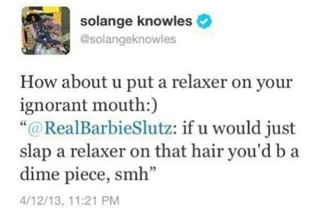 When Black women choose to maintain their hair naturally, they get cultural pushback. Strangers will literally come up to you and ask, “Can I touch your hair?” Sometimes they will even disregard your personhood and just touch your hair. People will also criticize you for having “nappy hair” and feel like they have the right to tell you to change your look. Just ask Solange Knowles, who had to call out this nonsense in a Twitter exchange. People with no couth may even ask if your hair is real if you have grown long hair because they are accustomed to the notion that Black women wear weaves and fake hair pieces.
When Black women choose to maintain their hair naturally, they get cultural pushback. Strangers will literally come up to you and ask, “Can I touch your hair?” Sometimes they will even disregard your personhood and just touch your hair. People will also criticize you for having “nappy hair” and feel like they have the right to tell you to change your look. Just ask Solange Knowles, who had to call out this nonsense in a Twitter exchange. People with no couth may even ask if your hair is real if you have grown long hair because they are accustomed to the notion that Black women wear weaves and fake hair pieces.
Black women with chemically relaxed and straightened hair also experience cultural abuse. They are criticized for trying to “look white”, taking the easy road, or conforming to a white aesthetic. Chris Rock and HBO films produced the documentary "Good Hair” in 2006 to explore why Black women hold straight long hair as the prevailing beauty ideal. Four years later, Tyra Banks makes national news when she announces on Twitter that she is going weaveless during the next season of America’s Next Top Model. Permed hair and weaves are waning in popularity as a growing number of Black women transition to natural hair styles.
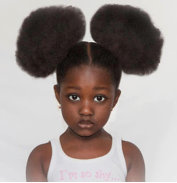 These types of cultural push back take a toll on all of us. Hair does not mean the same thing to white women as it does to Black women. For us, the cultural weight and social value of straight hair is very strong. Mental health experts routinely counsel Black women on hair issues that negatively impact self-esteem and body image. Black women can find strength and support by engaging with one of the many online communities devoted to Black women’s hair. Madam Noire offers a list of hair blogs for natural sistahs who need support. Also be sure to read through the comments for additional recommendations. Check out Tumblr and Pinterest as sources for inspirational images and videos. A simple search on YouTube will get you connected to “how to” videos on twist outs, transitioning from relaxed to natural hair, Marley braids, wash-n-go styles, bantu knots, straightening hair without heat, and a many other styling techniques. You can also direct your culturally uninformed coworkers and friends to CNN’s natural black hair etiquette guide on its website.
These types of cultural push back take a toll on all of us. Hair does not mean the same thing to white women as it does to Black women. For us, the cultural weight and social value of straight hair is very strong. Mental health experts routinely counsel Black women on hair issues that negatively impact self-esteem and body image. Black women can find strength and support by engaging with one of the many online communities devoted to Black women’s hair. Madam Noire offers a list of hair blogs for natural sistahs who need support. Also be sure to read through the comments for additional recommendations. Check out Tumblr and Pinterest as sources for inspirational images and videos. A simple search on YouTube will get you connected to “how to” videos on twist outs, transitioning from relaxed to natural hair, Marley braids, wash-n-go styles, bantu knots, straightening hair without heat, and a many other styling techniques. You can also direct your culturally uninformed coworkers and friends to CNN’s natural black hair etiquette guide on its website.
Sadly, our baby girls also face these hair and self-esteem issues. Just this year, for instance, there was an incident where a school in Ohio attempted to ban afro puffs and small twisted braids. If you’re in need of support, Sesame Street produced a much talked about song, “I love my hair”, to help young Black girls feel positive about their hair. And Amazon.com has a list of Black children’s hair books available for purchase. There are also blogs, YouTube channels and other websites devoted to caring for Black girl’s hair.
Whether you’re curly, kinky, loc’d, or straight, it’s all good hair sistahs!
Follow us at tumblr.myhealthimpactnetwork.org (Tumblr)
Follow us on Twitter @myhealthimpact
Share
In Partnership with: Poole College of Management, College of Humanities and Social Sciences, National Science Foundation, Penn State
Take Action, Get Tested: Find Your Local Testing Center Why Get Tested?
